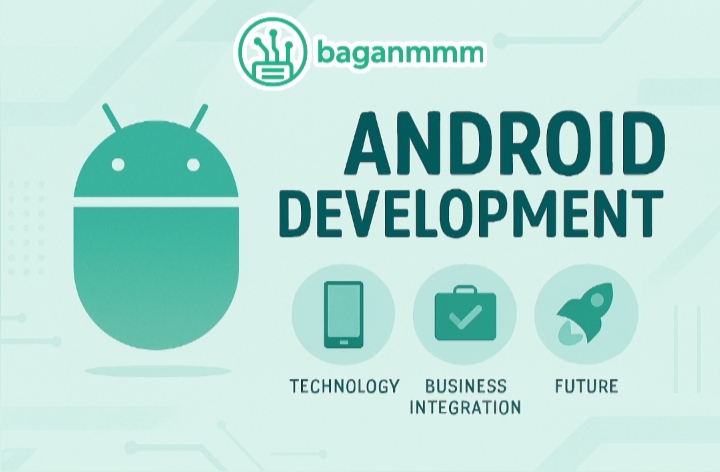In today’s economic ecosystem, Android applications have become essential for every business. Since smartphones have become “everything,” mobile technology is widely used, and the role of developers has become increasingly important.

In industries such as banking, e‑commerce, healthcare, stock markets, and social media, mobile technology is now indispensable. With Android holding about 70% of the mobile technology market share, opportunities for Android developers are abundant.
In this blog, I will discuss the importance of Android development in the business sector and provide insights into its future prospects. Whether you are already an Android developer or just a beginner, Android development can be a successful tech career path for you.
In the vast digital landscape of 2025, Android development stands as one of the most dynamic and influential forces shaping how billions of people interact with technology. What began as a mobile operating system has evolved into a global ecosystem powering smartphones, tablets, wearables, smart TVs, in-car systems, and even household appliances. Android is no longer confined to handheld devices; it’s embedded in daily life, driving innovation across industries and continents.
With over 70% of the global mobile market share, Android offers developers and businesses an unparalleled opportunity to reach users in every corner of the world from urban tech hubs to remote villages. Its open-source foundation, flexible architecture, and massive device diversity make it the most accessible and customizable platform for building digital experiences.
But Android development today is not what it was five years ago. The tools, languages, and design philosophies have undergone a radical transformation. XML layouts are giving way to Jetpack Compose. Java has been eclipsed by Kotlin. AI and machine learning are now native features, not add-ons. Developers are building apps that respond to voice, adapt to foldable screens, and run seamlessly across phones, watches, and dashboards.
At the same time, Android has become a strategic asset for businesses enabling mobile banking in emerging markets, powering logistics in real time, and delivering personalized healthcare through wearable sensors. From startups launching MVPs to enterprises scaling global platforms, Android is the backbone of mobile innovation.
This blog explores the full scope of Android development in 2025 tracing its origins, unpacking the latest technologies, examining its integration into business, and forecasting where it’s headed next. Whether you’re a seasoned developer, a tech entrepreneur, or simply curious about the future of mobile, this guide will give you the clarity and context to understand why Android remains one of the most important platforms in the digital age.
Brief History of Android Development
- 2003: Android Inc. was founded by Andy Rubin, Rich Miner, Nick Sears, and Chris White.
- 2005: Acquired by Google, laying the foundation for a major transformation in mobile OS.
- 2008: The first commercial Android device, the HTC Dream (T-Mobile G1), was introduced.
- 2010: Android became dominant worldwide, with rapid updates and challenges of fragmentation.
- 2014: Material Design was introduced, creating a unified design language.
- 2017: Kotlin was officially supported as a first-class language for Android.
- 2020–2024: Jetpack Compose, AI integration, and foldable device support emerged.
- 2025: Android development enters a new era — intelligent, modular, and cross-platform.
These are the year-by-year milestones of Android development. Today, Android dominates about 70% of the mobile market. This reflects the success of Android over more than a decade. In 2025, let’s explore the latest technologies and ongoing transformations in Android development.
Latest Android Development Technologies (2025)
Here are the key technologies shaping Android development today:
1. Kotlin as the Primary Programming Language
- Kotlin has surpassed Java as the main language for Android.
- Supports concise syntax, null safety, and Java interoperability.
- Improves developer productivity and app performance.
Because it can even modify Android’s main core, Kotlin is a language every Android developer should learn.
2. Jetpack Compose
- Google’s modern UI toolkit for building native interfaces with declarative code.
- Replaces XML-based layouts with composable functions.
- Enables faster UI development and real-time previews.
It has become an essential UI toolkit for modern apps.
3. AI & Machine Learning Integration
- Tools like TensorFlow Lite and ML Kit enable on-device intelligence.
- Use cases include predictive UX, voice assistants, image recognition, and chatbots.
- AI is no longer a luxury — it’s now a standard feature in Android apps.
As we are in the AI era, AI integration has become essential. Likewise, AI companies such as ChatGPT, Gemini, and Copilot are providing developer APIs.
4. Cross-Platform Frameworks
- Frameworks like Flutter (Google), MAUI (.NET), and Avalonia are gaining popularity.
- Build Android, iOS, desktop, and web apps from a single codebase.
- Ideal for startups and teams needing fast deployment.
As the name suggests, cross-platform frameworks allow one codebase, which brings many advantages: reduced budget, faster development time, app stability, UI consistency, and easier maintenance.
5. 5G & Edge Computing
- Supports real-time data transfer, immersive AR/VR, and IoT integration.
- Enables Android apps to deliver richer media, faster streaming, and smarter connectivity.
With the rise of 5G, Android smart devices have also improved in quality. This has brought significant changes in communication, healthcare, banking, and even government services.
6. Foldable & Multi-Screen Support
- Android 12L and later versions optimize UI for foldables, tablets, and dual-screen devices.
- Developers must design adaptive layouts and responsive experiences.
This is a revolutionary change in the UI world, but it also presents new challenges that require developers to work harder.
7. Privacy & Security Enhancements
- Scoped storage, biometric authentication, and encrypted data handling.
- Android 13+ emphasizes user control and transparency.
These are the essential processes in Android development as of 2025, introduced here for junior developers. While there are challenges, with continuous learning they can be overcome more easily.
Android Integration in Business
Android is not just for consumers it’s a powerful platform for business innovation:
| Sector | Android Use Cases |
|---|---|
| Retail | Mobile POS systems, inventory scanning, digital price tags, loyalty apps, in-store kiosks |
| Healthcare | Telemedicine, patient monitoring, EHR viewers, Bluetooth medical devices, medication reminders |
| Logistics | Fleet tracking, route optimization, barcode/RFID scanning, delivery proof (POD), driver apps |
| Finance | Mobile banking, biometric authentication, AI fraud detection alerts, personal finance tools |
| Education | E-learning apps, classroom device management, assessment tools, AR learning experiences |
| Hospitality | Smart room controls, booking/check-in apps, digital concierge, in-room tablets, menu ordering |
| Manufacturing | Shop-floor dashboards, machine condition monitoring, IoT controls, maintenance checklists |
| Field Services | Work order management, offline forms, photo evidence capture, GPS time tracking |
| Public Sector | Citizen service apps, emergency alerts, permit/license processing, field inspections |
| Retail Banking Agents | Agent banking apps, KYC capture, micro-loans onboarding, cash-in/cash-out recording |
Because Android is open-source and can be used across a wide variety of devices, it has become one of the best solutions for building custom enterprise applications. With the rise of cross-platform technologies and AI integration, costs are being reduced, making Android development increasingly important even for starter businesses.
The Future of Android Development
The next phase of Android development will be shaped by:
- Ambient Intelligence : Apps that adapt dynamically to context, location, and user behavior
- Voice-First Interfaces : Integration with Google Assistant and custom voice commands
- Wearables & IoT : Expansion into smartwatches, fitness bands, and connected devices
- Decentralized Apps (dApps) : Blockchain-based Android apps enabling secure transactions
- Low-Code/No-Code Android Builders : Making app creation accessible to non-developers
- Sustainability & Efficiency : Lightweight apps optimized for low-power devices and emerging markets
- Wearable AI Devices : Google Glass, Apple VR, Meta Glass, and similar innovations
Android is no longer just a phone operating system — it is evolving into a multi-surface, multi-sensory platform. With the rapid growth of mobile technology, smart technology, IoT, and AI, combined with Android’s ability to integrate seamlessly, the future points toward Android becoming a platform that will be present everywhere.
Final Conclusion
In 2025, Android development has advanced significantly. The tools and frameworks required have become more powerful and more diverse, and you can easily access and use them.
For learning, there are plenty of courses, tutorials, and documentation available. You can study extensively through online learning platforms.
From a job market perspective, since Android holds about 70% of the mobile technology market share, there are abundant opportunities. In this fast‑growing and competitive era, it is important not to fall behind.
As an Android developer, you can also create your own independent income streams.
For example:
- Build your own learning platform and provide services in the education sector.
- Develop a healthcare app to serve the medical field.
- Contribute to the banking sector with secure mobile solutions.
- Enter industries such as gaming, blogging, social media, and communication with your apps.
In addition, for monetization, you can integrate services like AdMob and Unity Ads.
So, let’s begin your career path in Android development.
Disclaimer:
This content is for educational purpose only.
Alice is the visionary behind Baganmmm Tech, a platform he founded with a passion for demystifying the complex world of technology. As the Lead Technologist, he's often found in his home lab – a cozy, wire-filled sanctuary where ideas are born and code is meticulously crafted. His infectious enthusiasm and knack for explaining intricate concepts make him the go-to expert for everything from web development to emerging tech trends.
